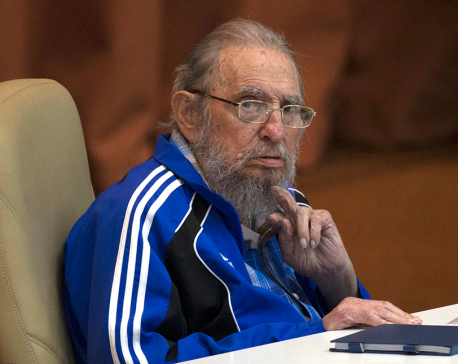
OR

Usha Pokharel
Usha Pokharel is an educationist and author of several children’s books.usha@pokharel.net
Grief is not a problem to be solved, rather a process to be tended and lived through regardless of form and duration of time
I know this is a very sensitive topic to write about. At the same time it is also a very personal thing for someone who is actually facing grief. I know some might be thinking as to how I am being so insensitive to write about it. Actually news of someone passing away makes me very sad.
Recently I heard about too many instances of death. This prompted me to write about this topic. Death. Something mysterious, something unknown yet something that is unavoidable. Everyone has to face it one day, but still we are not ready to accept it. This is one reality that all are aware of but not all are able to talk about it.
Some of us might be able to talk about it but there is not much to say except, “I know how you feel” if you have experienced such grief: a natural reaction to losing someone near and dear to you. Then again we are literally tongue tied when it comes to talking about grief. There is still a lot to learn about death. So we can only talk about the present.
Rituals and mourning
The present brings us to the after-death rituals that Hindus in Nepal observe. I have looked at it many times and have questioned every aspect of it as a child, teenager and adult. Each time I come up with different interpretation of it. I find that each action has a rationale. As long as the person is breathing, there are different relations attached to him/ her but as soon as that stops, all relations cease to exist and it becomes a dead body. That is the first act of differentiation of a living being, different relations and a dead body that has no relation at all.

All love and affection is for the soul and not the dead body. Hence the first significant action at the Ghaat is Daag Batti also known as Agni Daan. That is usually performed by putting fire in the mouth of the dead body. By that all time attachment to the dead body is fully removed and the rituals take over.
So many things are happening at the same time that the survivors have very little time to lament the loss of the dear one. The grief is still there however distracted. When a person sits in Kora, that is the first meeting with grief. It’s the time reality sinks in and the survivors think about their loss and what they now miss. This is also the time to start coping with the loss of their loved one. This is time to understand loss as universal experience and start to understand the true nature of grief and that is the beginning of the healing process.
The different rituals that take place during the 13 days help the person to do just that. These 13 days is also the time for people to heal from their loss and grief that cannot be hurried through by friends and family. How a person responds and makes adjustments to bereavement depends entirely on the individual. It is entirely understandable and natural for the people involved to experience a host of negative reactions in the weeks and months following the loss of a loved one.
Grief as such is a normal human reaction and not a disease at all. Hence there is no one right way to get through it. Repeated interaction with friends and visitors and constant narration of the event and talking about the departed soul helps to come to terms with the grief the survivors are feeling. We need to understand that depending on a person’s attachment to the departed person, recovery and adjustment can take longer or shorter than anticipated. Those trying to help need to clearly understand that grief cannot be fit into a preordained time frame.
Too often people who experience a loss are belittled because their mourning persists longer than others think reasonable or because they remain self-contained and seem not to mourn at all. Some might think of the reaction as unnatural. Under such circumstances people fail to understand that it is entirely possible that the death in the family might have been premature. Or the person who died was suffering a lot and at the same time the family was suffering too.
Responding to grief
We need to understand that grief is not a problem to be solved, rather a process to be tended and lived through regardless of the form and the duration of time. We need to understand that recovery and readjustment may take more time than we anticipated.
We need to learn to respond to grief in ways that doesn’t prolong, intensify or dismiss the pain others are feeling. But sometimes, even when the loss is neither sudden nor unexpected, survivors close to the deceased can experience extremely disruptive grief reactions that persist far longer. Usually within six months of a death, survivors adjust and are able to resume normal activities and remember loved ones without experiencing pain. People “reinvent their lives by revising goals and making plans” without including their lost loved ones.
Finally, the only way to survive grief is by accepting its existence, and not by trying to cover it up or rush through it. We also need to understand that pain does not go away by ignoring or hiding it, rather allowing it to exist helps the healing process. Just remember that one can never get over grief, one can only get on with it. You never move on. Instead you move forward with it.
The author is an educationist and author of several children’s books
usha@pokharel.net
You May Like This

Understanding UTI
It is said that Urinary Tract Infection (UTI) is so common that it affects more than 50% of women at... Read More...

President, PM express deep grief over demise of Fidel Castro
KATHMANDU, Nov 26: President Bidya Devi Bhandari has expressed deep grief and sorrow over the demise of former Cuban President... Read More...

Infographics: Understanding Indian economy
Understanding Indian economy ... Read More...






Just In
- CM Kandel requests Finance Minister Pun to put Karnali province in priority in upcoming budget
- Australia reduces TR visa age limit and duration as it implements stricter regulations for foreign students
- Govt aims to surpass Rs 10 trillion GDP mark in next five years
- Govt appoints 77 Liaison Officers for mountain climbing management for spring season
- EC decides to permit public vehicles to operate freely on day of by-election
- Fugitive arrested after 26 years
- Indian Potash Ltd secures contract to bring 30,000 tons of urea within 107 days
- CAN adds four players to squad for T20 series against West Indies 'A'












Leave A Comment